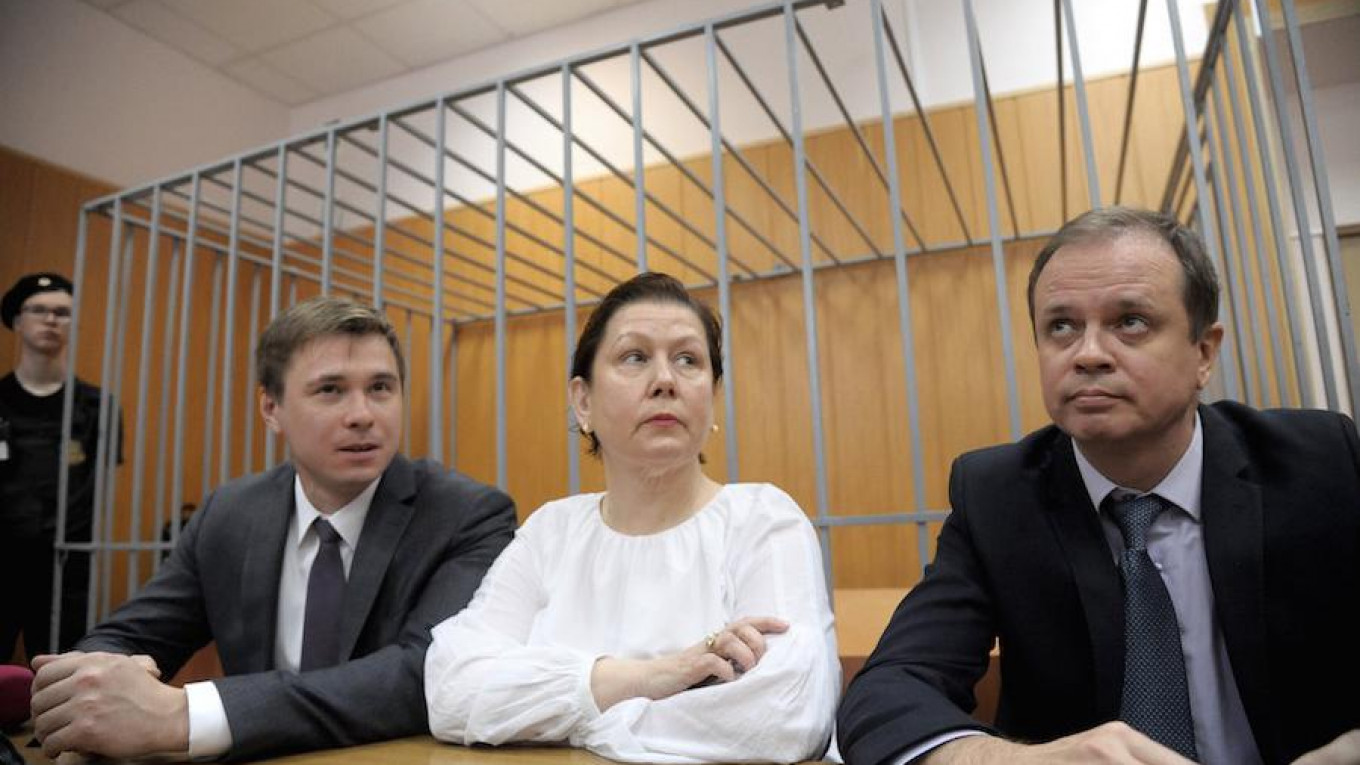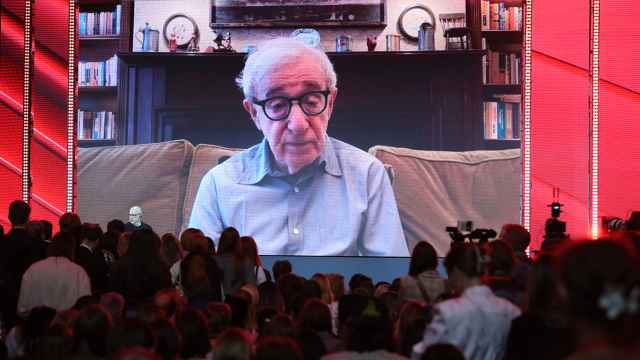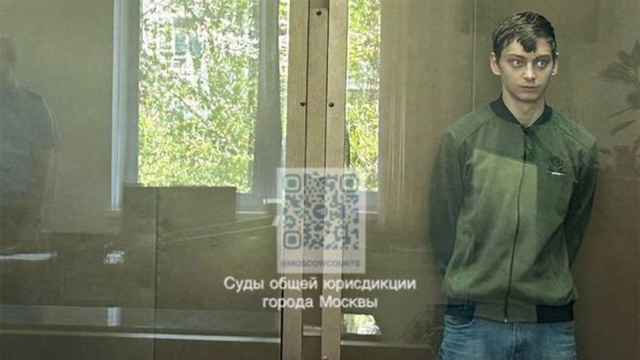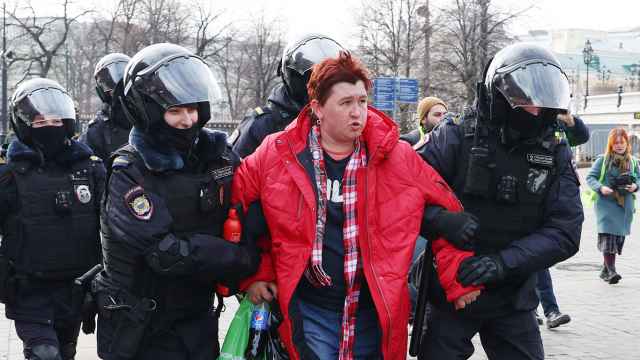Compared to most librarians, the last 19 months have been unusually dramatic for Natalya Sharina. The 59-year-old director of the State Library of Ukrainian Literature has endured house arrest, repeated court hearings, and a spinal compression fracture in police custody — all after being accused of “inciting ethnic hatred” and “distributing extremist materials.”
“I don’t understand which of my daily actions as a library director constituted a crime,” Sharina testified in one of dozens of hearings this year.
When proceedings against her began in November 2016, the prosecution said Sharina’s library housed “extremist” books, including “A War in the Crowd” written by radical Ukrainian nationalist politician Dmitro Korchinsky. Sharina was personally responsible because she put them on the shelves, state prosecutors said.
The library director and her defense team argued that she could not be held responsible.
“That was never part of my job,” she testified in court. “I never worked with books or readers directly.”
But the court was unmoved. On June 5, Sharina was found guilty and handed a four-year suspended sentence. “I am shaken to the core by this whole situation,” the former library director told reporters commenting on the verdict. “It is so surreal—to be convicted only because I am the director of the Library of Ukrainian Literature!”
The trial, which is probably the most controversial Ukraine-related trial of a Russian citizen in recent years, was described by human rights advocates as an “extremism witch-hunt.”
Russian authorities have increasingly used anti-extremism laws to go after regular citizens who are anything but “extreme,” Yulia Gorbunova, Russia and Belarus researcher at Human Rights Watch, told The Moscow Times.
“Every year, Russian courts hand down hundreds of unlawful ‘extremism’ verdicts,” Gorbunova says. The verdicts are usually a response to viewpoints authorities find “threatening or divisive,” she says. In this context, Ukraine and Crimea remain a painfully sensitive topic.
Planted evidence?
The state’s case against Sharina went ahead even as crucial questions remained unanswered. What exactly had the director done that constituted a crime? Where had the extremist materials come from?
Russian police first searched Sharina’s library—and opened their first extremism case against her—seven years ago. Police found Korchinsky’s “A War in the Crowd,” in 2010, not during a raid in October 2015, Sharina testified in court.
“We didn’t have [that book] in [October 2015]. So we were surprised that this same book was seized in 2015, too,” she said, in what was a tacit allegation the police had planted the text.
The defense was also surprised to see an unfamiliar edition of “A War in the Crowd,” offered as evidence during proceedings this year. Sharina’s lawyer Ivan Pavlov said, not only was it a different edition from the copy allegedly seized in 2015, it had no library stamps.
The prosecution submitted CDs of songs of the Ukrainian National Assembly—Ukrainian People’s Self-Defence, an organization banned in Russia too. These were also supposedly found in the raid in 2015. According to Sharina, they could not have been stored at the library.
Pavlov says he is convinced evidence was planted during the raid. “We had witnesses—people who were present during the raid—testifying that they saw these materials being planted,” he told The Moscow Times.
“When the judge asked the investigator about it, he blushed and went silent for almost a minute before denying it.” But neither the investigator, nor the prosecution offered any counter-arguments.
A way out
For the prosecution, “deeper issues” were at stake. “Ukrainian nationalism, which went hand in hand with German Nazism during the World War II, has raised its head again,” the state’s prosecutor Lyudmina Balandina said in her closing statements May 29.
The same people who “usurped” power in Ukraine are siding with Ukrainian nationalists, she said, and “openly talking about the need to occupy Russian regions, led by criminal ideas outlined in this so-called literature.”
“Ukraine’s leaders are cracking down on its Russian population by banning Russian language, traditions, holidays and culture,” Balandina continued. “I believe the defendant is part of a complex mechanism designed to discredit Russian culture in Ukraine.”
The prosecutor’s speech demonstrated that the case against Sharina was purely political, says Pavlov.
“We tried hard to avoid political statements in this case and stir it towards law rather than politics,” the lawyer says. “But the prosecutor exploded and said it all.” “It happens in cases like this one, which aren’t very solid from a legal standpoint. [They] aren’t looking for justice, but rather a way out.”
For Natalya Sharina—who for nearly two years was confined to her apartment, unable to visit family, make phone calls or leave for more than two hours a day—a four-year suspended sentence is, perhaps, a way out.
A Message from The Moscow Times:
Dear readers,
We are facing unprecedented challenges. Russia's Prosecutor General's Office has designated The Moscow Times as an "undesirable" organization, criminalizing our work and putting our staff at risk of prosecution. This follows our earlier unjust labeling as a "foreign agent."
These actions are direct attempts to silence independent journalism in Russia. The authorities claim our work "discredits the decisions of the Russian leadership." We see things differently: we strive to provide accurate, unbiased reporting on Russia.
We, the journalists of The Moscow Times, refuse to be silenced. But to continue our work, we need your help.
Your support, no matter how small, makes a world of difference. If you can, please support us monthly starting from just $2. It's quick to set up, and every contribution makes a significant impact.
By supporting The Moscow Times, you're defending open, independent journalism in the face of repression. Thank you for standing with us.
Remind me later.






